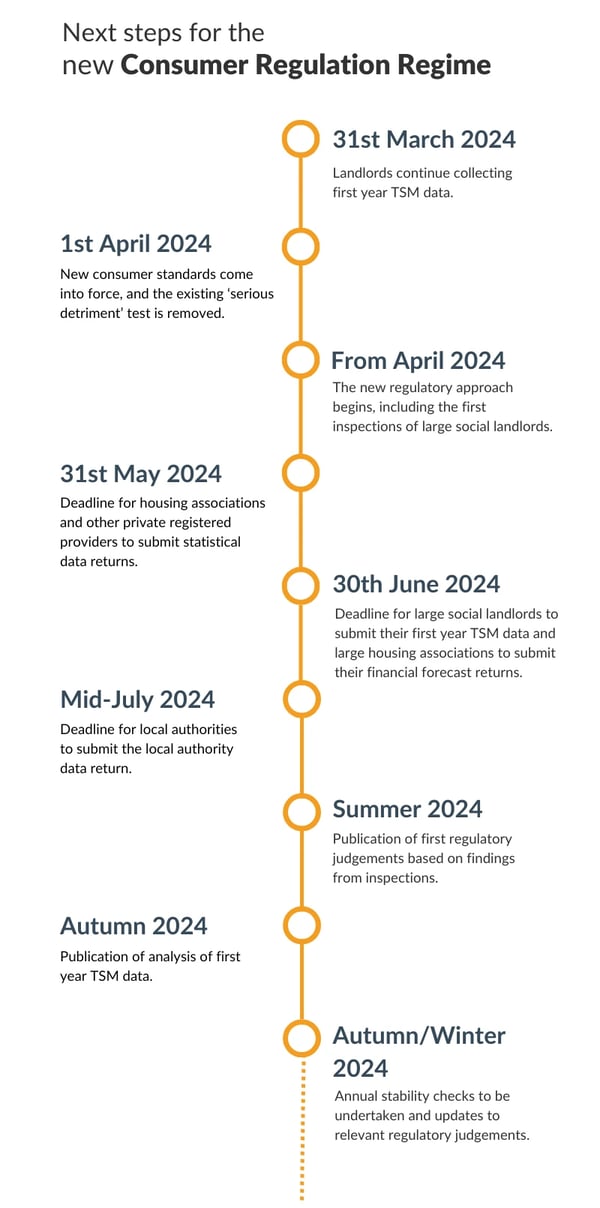Sign up to our newsletter
Last updated: 28th May 2024
In a significant move to enhance tenant protection and improve services, the Regulator of Social Housing (RSH) set out its new regulatory approach on 29th February 2024. Insight into the new regime was first introduced by the Social Housing (Regulation) Act 2023, marking a proactive shift towards a more robust consumer regulation regime. The new regime and revised standards came into force from 1st April 2024.
To discover up-to-date expert insight into the lessons learnt since the implementation of the new standards, catch up on our latest webinar, 'New Consumer Regulation Regime: Insights and updates', on-demand now.
“Social landlords must keep tenants safe in their homes, listen to what they say and put things right when needed. We are introducing new standards to drive improvements in social housing, and we will actively inspect landlords to check they are meeting them.” - Fiona MacGregor, Chief Executive of RSH
The director of regulatory engagement at the RSH joined our January webinar, where she provided insights into the upcoming changes and expert advice on preparing for April. Watch the webinar on-demand now to discover top tips for compliance.
To help you understand the headline updates, we’ve created a comprehensive summary of the key guidance published by the RSH in February so you can adapt your practices to comply with the regulations that commenced in April.
‘Reshaping consumer regulation: Our new approach’
The main document released is titled ‘Reshaping consumer regulation: our new approach’ and outlines the key regulation changes, including:
- Detail on the new standards expected of social housing landlords.
- The context behind the changes, including the role of the Social Housing (Regulation) Act 2023.
- RSH’s overall approach to delivering social housing regulation.
- A plan for undertaking landlord inspections and reviews.
- Detail on the removal of the ‘serious detriment’ test.
The document also outlines the next steps for the new approach to regulation. Here’s the key date timeline to ensure you’re up to date throughout the process:

The revised consumer standards
Here are the final revised consumer standards that all landlords are now being regulated against since April 2024:

Under the new standards, landlords must:
- Ensure tenants are safe in their homes.
- Listen to tenants’ complaints and respond promptly to address problems.
- Be accountable to tenants and treat them with fairness and respect.
- Have comprehensive knowledge of the condition of every home and the needs of the tenants.
- Collect and use data effectively across various areas, including repairs.
To help landlords deliver the outcomes, the RSH has also published a code of practice to amplify the requirements of the standards and provide an example of what compliance may look like.
It’s important to note that the ‘serious detriment’ test has been removed under the new standards. This means the RSH can investigate and take action where there is evidence of potential landlord failures in the consumer standards in the same way they currently do for our other standards.
To discover expert insight directly from the RSH on the new standards and lessons learnt from pilot inspections, read our dedicated blog, ‘How Can the Sector Best Prepare for the Consumer Regulation Changes?’.
Plan for undertaking landlord inspections
As part of the information pack, the RSH published a document on ‘Regulating the standards’, outlining specific information on their approach to landlord inspections, responsive engagement with landlords, and regulatory judgements and gradings.
To hold landlords to account and ensure they’re compliant with the new standards, the RSH will:
- Regularly inspect larger landlords to check they are meeting the outcomes in the standards.
- Scrutinise data about tenant satisfaction, repairs, and other relevant issues.
- Continue to push landlords to protect tenants and address problems.
- Use a range of tools, including new enforcement powers, as needed.
- Maintain focus on the financial viability and governance of housing associations as part of its integrated regulation.
Programmed inspections for large landlords will be carried out at least every four years. However, the frequency is linked to the assessment of risk, meaning buildings with higher risk levels may undergo more frequent inspections.
.webp?width=600&height=150&name=Pennington%20Choices%20Logo%20(reduced).webp)





